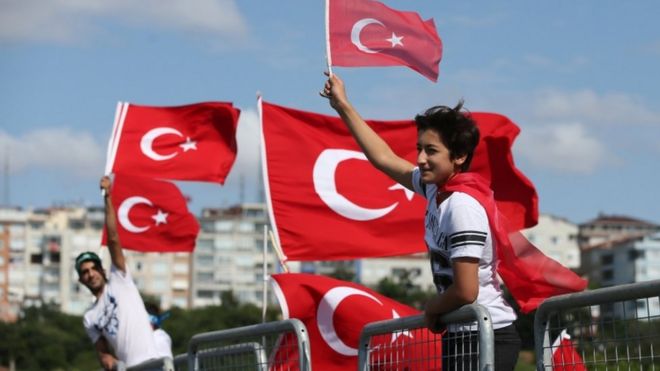Turkey is holding a series of events to mark the first
anniversary of a failed coup in which at least 260 people died and 2,196 were
wounded.
President Recep Tayyip Erdogan will unveil a memorial on an
Istanbul bridge that became a landmark of resistance and will later address
parliament.
An army faction tried to seize power last 15 July but the
attempt collapsed.
The government has since dismissed more than 150,000 state
employees, saying it is rooting out coup supporters.
Critics say the dismissals, and a wave of 50,000 arrests,
are part of an attempt to purge dissent.
The human impact of Turkey's purges
The officers who cannot go home
The date of 15 July has been declared an annual holiday.
Kicking off a series of events that will extend into dawn on
Sunday, Prime Minister Binali Yildirim told a special session of parliament
that 15 July 2016 was a "second War of Independence", following the
conflict that led to the creation of the modern state in the 1920s.
"It has been exactly one year since Turkey's darkest
and longest night was transformed into a bright day, since an enemy occupation
turned into the people's legend," Mr Yildirim said.
However, Kemal Kilicdaroglu, the head of the main opposition
Republican People's Party, condemned the government's actions since the coup.
He said: "This parliament, which withstood bombs, has
been rendered obsolete and its authority removed. In the past year, justice has
been destroyed. Instead of rapid normalisation, a permanent state of emergency
has been implemented."
Mass rallies are now under way, with thousands gathering in
Istanbul, waving national flags.
Mr Erdogan will attend an event on the bridge across the
Bosphorus where crowds had confronted soldiers. It has been renamed the Bridge
of the Martyrs of July 15 and the president will unveil a "martyrs'
memorial" there.
Istanbul is awash with giant anniversary billboards and
posters showing people confronting pro-coup soldiers, with anti-coup slogans
strung between the minarets of mosques.

